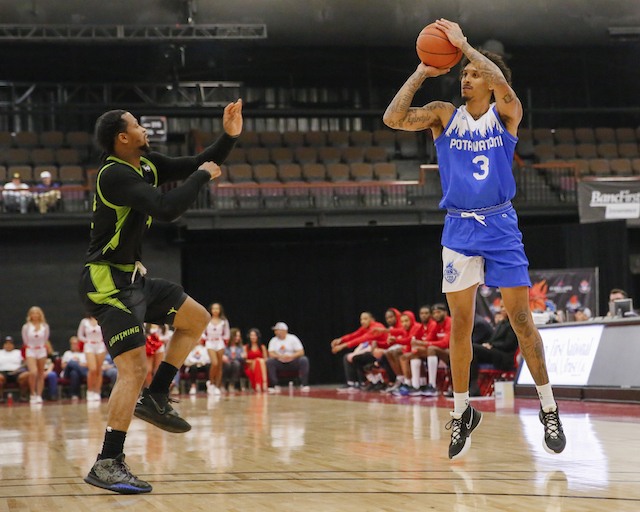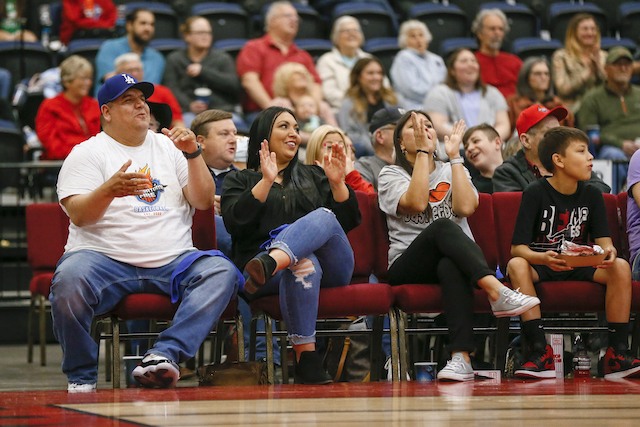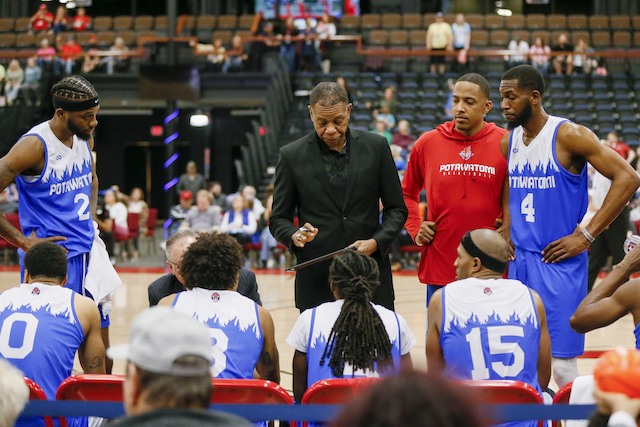Land and basketball: ‘We’re bringing the fire’
Unknown Contributor
Unknown Publication

The FireLake Arena, home of the Potawatomi Fire, on March 19, the first home game of the season. (Photo by Rachael Melot, courtesy of Citizen Potawatomi Nation)
Citizen Potawatomi Nation makes history in Oklahoma with new professional basketball team
This story is part of a collaborative series, “At the Crossroads,” from the Institute for Nonprofit News, Indian Country Today, KOSU and eight other news partners, examining the state of the economy in Indian Country. This reporting was made possible with support from the Walton Family Foundation.
By Allison HerreraKOSU Radio
SHAWNEE, Oklahoma – It was three days before the first game and the newly crowned Potawatomi Fire players were shooting baskets, talking with reporters and hamming it up with fans at FireLake Arena.
While other players posed for selfies and shot videos for Instagram, a group of players, including Mustapha Traore, took a break from the action.
“Excited to play on the team to get some exposure, just trying to put myself back out there – basketball purpose,” said Traore who hails from Philadelphia. He said living in Shawnee was definitely a change of pace.
“Out here there’s nothing but land and basketball.”
Traore is confident that he and his teammates are going to win the championship this year.
He’s not the only one with high hopes for the Citizen Potawatomi Nation’s new minor league basketball team, which kicked off its inaugural season March 4 in The Basketball League after being formally unveiled in September.
The team name was chosen carefully – the Potawatomi were originally known as Bodewadmi, the People of the Place of the Fire, and the tribal seal features a pipe and tomahawk over a log fire.
The Potawatomi Fire is the first tribally owned sports team in Oklahoma, and one of only a handful of professional teams owned by tribal nations in the U.S. The Mohegan Tribe in Connecticut owns both the Connecticut Sun in the Women’s National Basketball Association and the New England Black Wolves in the National Lacrosse League.
It’s also a new business venture for the Citizen Potawatomi Nation, which operates the FireLake Casino and Grand Casino Hotel & Resort, gas stations and grocery stores, a golf course, an industrial park, a sod farm, a batch plant, and a foam insulation business.
The sports franchise comes amid growing interest in “casino adjacent” businesses for tribes across Indian Country, as they branch out beyond casinos and gaming with green and renewable energy, environmental cleanup, hemp, entertainment and sports. Last fall, the Cherokee Nation Film Office announced it would offer millions of dollars in incentives to movie or television production companies that film on tribal lands. The Chickasaw Nation’s production department in 2021 released, “Montford: The Chickasaw Rancher,” on Netflix, a feature-length film set in Indian Territory.
Longtime Citizen Potawatomi Chairman John “Rocky” Barrett said the tribe invested in a basketball team to lure business and partnerships from surrounding communities and keep money circulating at home before it is spent elsewhere.
“We have a huge payroll,” Barrett told KOSU. “We have 2,200 employees. And whenever you’re putting out that kind of money in a payroll, and another $450 million or $400 million in vendor purchases, you want those dollars in the tribal economy to turn at least four times before they leave the tribe’s economy.“
Matthew Morgan, a Chickasaw Nation citizen who chairs the Oklahoma Indian Gaming Commission, said the basketball team will draw additional visitors to FireLake Arena, which has also been used as an entertainment venue.
“They’ve done a really good job of diversifying, I think, in terms of what their offerings are in the hospitality/entertainment sector,” Morgan said. “And that’s the way I saw their entry into the basketball foray.”
Heavy investments
The Potawatomi Fire players lit up the scoreboard at FireLake Arena on March 19, the first home game of the season. They hit three-pointer after three-pointer for a 123-93 win over the Little Rock Lightning.
Fans crowded into the arena, a mix of families and friends, young and old, waving blue-and-red towels every time a ball sunk through the net. The win put the team at 4-1 for the season.
It was also a chance to show off changes to the arena. The tribe invested heavily in the venue, with new dressing rooms, changes to the scoreboard and Jumbotron, and a new court. The team also has snazzy new uniforms with the logo and flames.
Investments have been heavy with the team as well. Players receive housing, a bus to get to the games, a per diemstipend and other things they say weren’t available to them at other TBL teams they considered.
Player Anthony Allen, who is almost 7 feet tall and hails from Jamaica, said the team has been given the utmost support.
“They treat the people in this organization a whole lot better and in a different standard than what most of the teams in the TBL are used to,” Allen said.

The team logo and name were selected at a time when sports mascots and logos are drawing national attention, but brand recognition is important, said General Manager David Qualls.
“We didn’t want to be the Eagles. We didn’t want to be the Wolves, you know. We didn’t want to be the Warriors,” Qualls said.
“Just think Miami Heat,” he said. “We are the Potawatomi Fire, and we’re bringing the fire.”
Former National Basketball Association player Derrick Rowland was the tribe’s first choice as head coach because of his history leading the Albany Patroons. He also played under legendary coach Phil Jackson while he was with the Denver Nuggets.
Qualls said the Fire players all wanted to play for Rowland, because they say he makes winners.
“I want to gravitate to the coach that I know can get me to the next level,” Qualls said.
Community outreach
The City of Shawnee is also getting a boost from the tribe’s investment.
Shawnee Mayor Ed Bolt, who has headed the city for almost a year and a half, recently de-annexed land the city had claimed as part of its tax base, essentially ending a nearly 60-year battle between the city and tribe.
The dispute started in 1961, when it was popular for cities to annex areas of land to get a bigger sales tax base to fund city services. But some of the land annexed along the North Canadian River was land in trust that belonged to the Citizen Potawatomi Nation.
At the time it was annexed, there wasn’t much there. It was a bet on the future. And the tribe didn’t have any financial or legal resources to fight the city.
But as fortunes changed for the Citizen Potawatomi Nation, the tribe countersued the City of Shawnee, saying the tribe was not given proper notice of the city’s intent to annex the land. The tribe also contended that the city didn’t have a legal right to annex in the first place, since the tribe purchased the land in 1867 and put it in trust as a sovereign nation.

“We’re not in the city and we were here before there was a city or the state,” Barrett said. “Our ownership of this property precedes the existence of both of those entities.“
The tribe is now the largest employer in Pottawatomie County, and is contributing to the broadening economic impact by tribal communities on the state of Oklahoma.
A recent report published by the Tribal Finance Consortium found that tribes had a $15.6 billion economic impact on the state in 2019, directly employing more than 54,000 people and supporting an additional 60,000 jobs for tribal citizens and non-citizens.
Tribes contributed more than $5.4 billion in wages and benefits to Oklahoma workers that year, and have made investments in infrastructure, health care and education, and are among the largest employers in the state, especially in rural communities like Shawnee.
‘Seven generation view’
Barrett likes to think of the tribe’s investments as being in line with their view of the world and their vision for the future, the “Seven Fires” prophecy.
The prophecy describes a turbulent time in Potawatomi history when the tribe was visited by seven prophets, and its telling has helped the Potawatomi people understand who they were, are and will be in the future.
Barrett said the tribe looks at investments in terms of 50 years into the future, not just 10.
“Indian tribes have a tendency to take a seven-generation view,” Barrett said.
Qualls compares the investment in the Potawatomi Fire to a garden, where a person doesn’t quit if only half the crops grow.
“Our business plan has never been one-and-done,” Qualls said. “You keep growing tomatoes and know that you’re going to have some losses and some wins.”
The key to the Citizen Potawatomi’s economic and political renaissance as a government and as a tribe was amending the constitution in 1983, Barrett said.
The tribe previously had operated under the Oklahoma Indian Welfare Act of 1936, which Barrett described as “a recipe for disaster.”

Under the old constitution, only a quorum was needed to make changes, including to elect new officers and council members and to replace the chairman.
“One family could hold a special general council and remove all the tribal officials and do whatever they wanted to do,” Barrett said. “And then the next weekend, another family could hold one. Whoever could get 50 people together could have a council and change the whole government.”
A new constitution brought stability and order, he said.
Officials are now elected by a majority of voters, allowing less fluctuation in leadership. Barrett has been chairman since 1985.
‘We’re not here to just shut up and dribble’
The team is making an impact off the basketball court as well.
Rowland hit the ground running after accepting the position as head coach, talking to Rotary Clubs and going to schools to promote the team and the game.
The message? “Eat your vitamins, say your prayers and do your homework and come see some basketball,” Qualls said.
Rowland said that once the season gets fully underway, he plans on taking the team to local schools to talk to students. It reaches young people but is also a good way to drum up tickets sales and promote the team, he said.

The community is also getting engaged. Qualls said he has been getting requests from businesses that want to have their banner on the wall during games, or who want to sponsor the dance team or the scoreboard. The scoreboard, however, was already snagged by Dr Pepper Zero for an undisclosed amount.
The economic arm of the City of Shawnee is supporting the team, as is First National Bank, which is owned by the tribe.
And tribal leaders want to keep the games affordable for families in the Shawnee area – something that won’t cost “as much as a set of tires,” Qualls said.
Ticket prices range from $10 for general admission seats to $27.50 for courtside seats, unlike the $15 starting ticket prices to see an NBA game with the Oklahoma City Thunder 40 minutes away.
“An elderly, retired couple or a younger couple with four kids on a school night, or Saturday night before church, can come and watch the Potawatomi Fire play and still be home before the 10 o’clock news comes on,” Qualls said.
Morgan, the gaming expert, said Potawatomi’s approach is what tribal governments should be doing when trying to create jobs and bring in more dollars for programs and services for their citizens.
“At the end of the day, you’re trying to make sure that your communities are bettered,” Morgan said.
Player Deon Lyle knows that he and the other players can be assets to the tribe and to the Shawnee area.
“We’re not here to just shut up and dribble,” said Lyle, a shooting guard for the team.
“They’re taking care of us very well, and they’re not just having us here to entertain. We’re here to, you know, be a part of the community and do more than just be a basketball player.”
This story is part of a collaboration from the Institute for Nonprofit News Rural News Network in partnership with INN members Indian Country Today, Buffalo’s Fire, InvestigateWest, KOSU, New Mexico In Depth, Underscore and Wisconsin Watch, as well as partners Mvskoke Media, Osage News and Rawhide Press. Series logo by Mvskoke Creative. The project was made possible with support from the Walton Family Foundation.
KOSU is an NPR station reporting on the people, places and culture of Oklahoma. Visit kosu.org/newsletters to sign up for the latest updates. Follow the station on Facebook, Twitter and Instagram.






